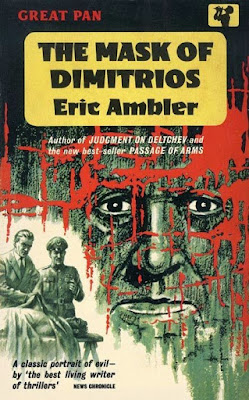By Ben Soton
If
you ever get a chance, the crime thrillers of Eric Ambler are well worth
reading. Many of his novels feature cross-continental travel and are a possible
inspiration for modern films such as the Bourne
trilogy. The emphasis on travel is in
contrast to the Agatha Christie model located in closed settings such as
country houses or strange holiday islands.
The Mask
of Dimitrios is an Ambler classic. This novel, first published in 1939 and
made into a film in 1944, is perhaps his best and certainly the most famous.
The Mask of Dimitrios is centred
around the discovery of the body of a petty criminal, Dimitrios Makropoulos, on the Turkish shore.
The character of Dimitrios is believed to be based on the Greek arms dealer Basil Zaharoff, a real ‘merchant of death’, although Ambler denied
all knowledge of him.
A British
novelist, Charles Latimer, takes an interest in the criminal’s biography with a
possible view to a new novel and indulges in some investigative journalism.
Latimer begins to unpick the life of this man as he travels across the Balkans
and uncovers his involvement in assassination attempts, espionage,
sex-trafficking and the illegal drugs trade. By making the hero a crime writer,
Ambler is able to make the story a critique of the typical crime novel of the
1930s, which is exemplified by the stories of Agatha Christie. In Christie’s
novels there is a dead body, a several suspects and a detective, and ends when
he or she uncovers the murderer. Ambler criticises this format by stating that
it simply does not reflect real life.
I myself have
often wondered how Agatha Christie’s ‘Miss Marple’, an elderly spinster living
in a remote village, could have such a wide understanding of the world. Many
murders are not solved or are even unnoticed, miscarriages of justice take
place, murderers sometimes escape justice and more importantly there is more to
crime than just murder. Murder is as much a symptom of criminal activity as
well as a crime in itself.
Ambler’s novel is
still relevant today with its references to the illegal trade in drugs and sex
trafficking. In the 1930s The League of Nations attempted to halt the
international sex trade; groups of women were often transported across
continents posing as dance troops. The book looks at crime from the perspective
of the criminal. In the story a former associate of Dimitrios, known as Mr
Peters, explains how the illegal drug trade is more lucrative than the sex
trade. Peters goes into detail that when trafficking a group of women across
Europe he is forced to keep them entertained in his club at some considerable
expense whilst he is concerned that one of the women may inform the
authorities. Meanwhile large numbers of single women in a night club would obviously
attract the attention of male customers. He goes on to say that heroin can
simply be stored in a warehouse at little cost in boxes marked “dates”.
The Mask of Dimitrios shows the distinctly
left-wing, progressive and anti-fascist sentiments of the author. In
particular, Ambler explores the role of criminal underworld types in the
intrigues of fascist plots and inter-imperialist rivalries. Dimitrios, whilst
in Bulgaria, was involved in an assassination attempt of a progressive
prime-minister and in 1923 the left-leaning
government of Alexander Stamboliyski was overthrown by
a coup of reactionary army officers. A few years later Dimitrios re-emerges in
Belgrade where he acquires military secrets of behalf of France. Meanwhile the
book portrays the Greek Communist Marukakis in a positive light, and shows a
shows international finance as corrupt and a harbinger of fascism.
Amber was a
staunch anti-fascist and many of his novels written in the 1930s also show
communists in a positive light. In another story, Uncommon Danger, the hero even collaborates with a Soviet agent.
Ambler
unfortunately drifted to the right during the Cold War. In 1951 he wrote Judgement on Deltchev, about a show
trial in a fictional eastern European country that right-wing journalist Peter
Hitchens, a turn-coat Trot, put on his “top five” list of anti-communist
thrillers.
But many of
Ambler’s novels written in the 1930s have a distinctly progressive tone, and
are a stark improvement on both Agatha Christie and reactionary thriller writers
such as Len Deighton and Frederick Forsyth.

No comments:
Post a Comment